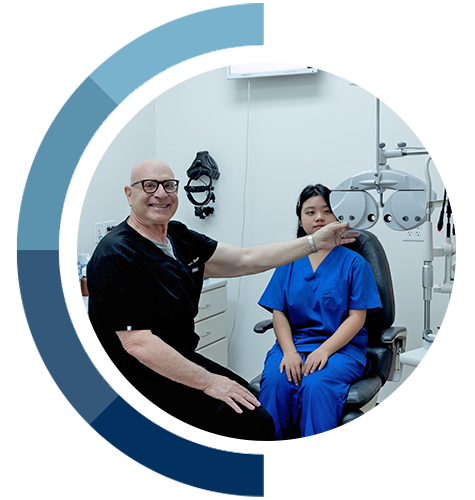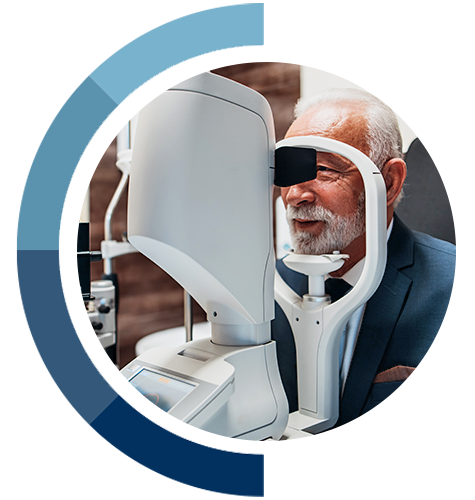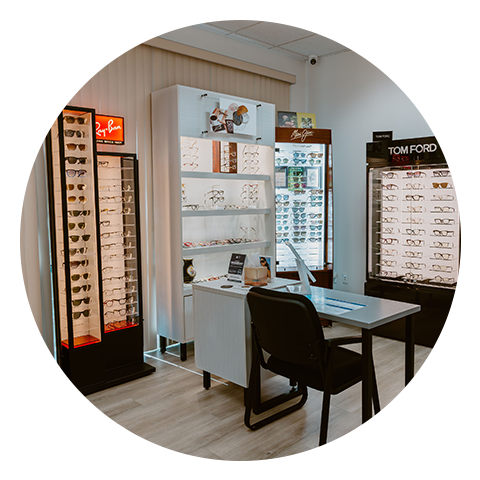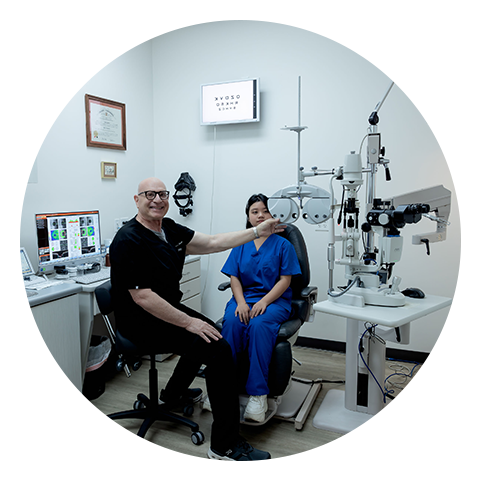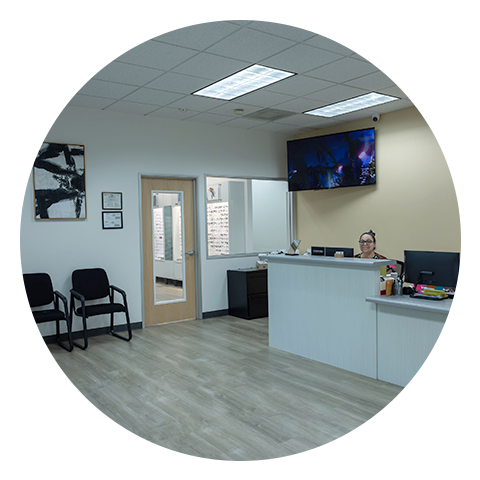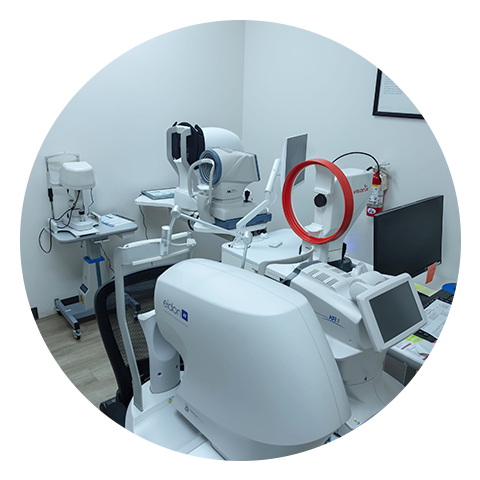Helping You Protect Your Vision for a Lifetime with Proactive Eye Care
At Stockton Optometry, keeping your eyes healthy is a lifelong priority.
Many vision problems, such as cataracts, diabetic eye disease, and glaucoma, often develop gradually, without early symptoms, but regular eye exams can make all the difference.
Our team combines years of experience with detailed diagnostic technology, helping us address potential issues early or prevent further damage. We can diagnose, manage, and treat many common eye conditions and diseases.
Your vision matters—to your life, your independence, and all the moments you treasure most. Book your eye exam today, and let us help you protect your eye health.
Request AppointmentWe’re Invested in Your Care
Vision is more than just seeing clearly; it’s essential to your quality of life. From recognizing loved ones to reading or driving safely, your eyes are vital to almost everything you do.
We focus on proactive eye care, because early detection can help preserve your vision and prevent future issues.
We don’t just run eye tests—we’re here to provide the care and support you need to keep your vision healthy for years to come.
Comprehensive Care for Eye Conditions & Diseases
Optometrists can diagnose, manage, and treat many common and complex eye conditions. Our Stockton Optometry team has invested in modern and powerful diagnostic technology to help us thoroughly monitor your eye health and vision.
Understanding these conditions is the first step towards taking control of your eye health. We believe in educating our patients so they can make informed decisions about their care, and we’re here to guide you every step of your eye health journey.
Cataracts
Imagine your eye’s lens as a clear window that helps you see. Over time, this window can get cloudy, like looking through a foggy glass. That’s what a cataract is—a clouding of the eye’s lens. It can make your vision blurry, hazy, or less colorful.
How it affects your eyes: Cataracts scatter light as it enters your eye, leading to blurry vision, glare, and difficulty seeing at night.
How it’s managed: Cataracts may not cause significant problems in the early stages. As they progress, treatment options include stronger glasses or contact lenses to help you see better. The only way to fully get rid of a cataract is through surgery, where the cloudy lens is replaced with a clear artificial lens.
Diabetic Retinopathy
Diabetes can sometimes affect the small blood vessels in your retina, the light-sensitive tissue at the back of your eye. High blood sugar levels can damage these vessels, causing them to leak or grow abnormally. This is called diabetic retinopathy.
How it affects your eyes: Diabetic retinopathy can cause vision loss in several ways. Leaky blood vessels can lead to swelling in the retina, while abnormal blood vessel growth can block light from reaching the retina. In its advanced stages, it can lead to blindness.
How it’s managed: Managing diabetes is key to preventing or slowing down diabetic retinopathy. Regular diabetic eye exams are crucial for early detection. Treatment options include medication, laser therapy to seal leaky blood vessels, or surgery in more advanced cases.
Age-Related Macular Degeneration (AMD)
The macula is a small but important part of the retina responsible for sharp, central vision—the kind you need for reading or recognizing faces. Age-related macular degeneration (AMD) is a condition that affects this area, usually in older adults.
How it affects your eyes: AMD can cause blurry vision, a dark spot in your central vision, or distorted vision. It can make seeing fine details or recognizing people’s faces difficult.
How it’s managed: There is no cure for AMD, but there are treatments that can help slow its progression. These include lifestyle changes, like a healthy diet, not smoking, and medications, or laser therapy in some instances. Early detection is vital to preserve as much vision as possible.
Glaucoma
Glaucoma is a group of eye diseases that damage the optic nerve, which connects your eye to your brain. It’s often called the “silent thief of sight” because it usually has no noticeable symptoms in its early stages.
How it affects your eye: Glaucoma often involves increased pressure inside the eye, which can damage the optic nerve. As the nerve gets damaged, you may start losing your peripheral vision, and eventually, it can lead to blindness.
How it’s managed: Early detection is key to managing glaucoma. Treatment options include eye drops, laser therapy, or surgery to reduce the pressure in your eye and prevent further damage to the optic nerve.
Dry Eye Disease
Dry eye disease is a common condition in which the eyes don’t produce enough tears or the tears they produce are poor quality. This can make your eyes feel dry, irritated, or gritty.
How it affects your eyes: Dry eyes can cause discomfort, blurred vision, and light sensitivity. It can also make it difficult to wear contact lenses.
How it’s managed: Treatment for dry eye depends on the severity of your condition. It may include lifestyle changes, artificial tears, warm compresses, and avoiding dry environments. We may recommend prescription eye drops or in-office procedures to help improve tear production or reduce tear drainage.
Keratoconus
Keratoconus is an eye condition in which the cornea, the clear front surface of the eye, gradually thins and bulges outward into a cone shape. This can distort vision.
How it affects your eyes: Keratoconus can cause blurry vision, sensitivity to light, and glare. It can also make it difficult to wear glasses or contact lenses.
How it’s managed: In the early stages, keratoconus can be managed with glasses or soft contact lenses. As it progresses, rigid gas-permeable (RGP) contact lenses may be needed to provide clearer vision. In some cases, a corneal transplant or other surgical procedures may be necessary.
Our Modern Diagnostic & Measurement Technology
At Stockton Optometry, we prioritize your eye health through proactive care. We leverage modern technology to detect potential issues early and deliver personalized vision solutions tailored to your needs.
Optovue OCT Retinal Imaging
The Solix Optovue OCT (optical coherence tomography) is an imaging technology that uses light waves to create detailed cross-sectional images of your retina, the light-sensitive tissue at the back of your eye.
Think of it like an “optical CAT scan” for your eyes. The scans allow us to see the different layers of your retina in detail, helping us detect early signs of eye diseases like macular degeneration, glaucoma, and diabetic retinopathy, often before symptoms even appear. Early detection can lead to earlier treatment and better outcomes for your vision.
MYAH Topographer & Myopia Management
The MYAH is a multi-functional instrument used for comprehensive eye assessments, focusing on managing myopia (nearsightedness).
Topography maps the surface of the cornea (the clear front part of the eye). This map helps us detect irregularities, fit contact lenses, and understand the shape and health of your eye.
For myopia management, the MYAH helps us track the progression of nearsightedness in kids, allowing us to create personalized treatment plans to slow or prevent its progression.
Firefly Digital Slit Lamp Microscope & Camera
The slit lamp is a high-powered microscope we use to examine the structures at the front of your eye, including the cornea, iris, and lens.
The Firefly adds a digital camera to this essential tool, allowing us to capture high-resolution images and videos of your eye. This helps us document our findings, track changes over time, and even share images with you so you can better understand your eye health.
Eidon Wide-Field Retinal Imaging
This technology provides wide, detailed images of your retina, capturing a much larger area than traditional retinal cameras. The in-depth images help us detect and monitor a wider range of retinal conditions, including peripheral retinal issues that might otherwise be missed.
The wide-field view is especially beneficial for patients with conditions like diabetic retinopathy, where changes can occur in the outer regions of the retina.
iCare Perimetry
Perimetry is a technology used to test your peripheral (side) vision. It measures your ability to see in different areas of your visual field. This test is crucial for detecting conditions like glaucoma, which often affects peripheral vision first.
The iCare COMPASS system is designed to be quick and comfortable for patients. It’s automated to enhance accuracy, even if your eye moves slightly during testing. This leads to more reliable and precise results, helping us better detect and manage conditions that impact your visual field.
Marco Digital Refraction System
Our digital refraction system streamlines the process of determining your eyeglass prescription.
Instead of manually switching lenses, the Marco system uses computer-controlled technology to help quickly and accurately refine your prescription. This innovative refraction process enhances the precision of your measurements and makes the process smoother and more comfortable for you.
A precise prescription enhances your visual clarity and reduces the risks of common issues caused by inaccuracies, such as eye strain and headaches.
Precision Scleral Lens Fitting with iContour
The iContour profilometer from Visionary Optics helps support more precise scleral contact lens fittings with 360-degree eye coverage. This imaging tool captures detailed maps of both the cornea and sclera, allowing us to design lenses that closely match the natural shape of your eye.
The result is a more comfortable fit, improved stability, and clearer vision, especially for patients with complex corneal conditions like keratoconus or a history of lens discomfort.
Your Eye Health in Caring Hands: Visit Us Today
If you have concerns about your eye health or questions about eye disease, contact us—we’re here to help you protect your vision and live a vibrant life.
We’re dedicated to providing thorough eye care at Stockton Optometry. Led by Dr. David Benkle, our experienced team helps you understand your eye health and make informed decisions. With modern diagnostic tools, we can accurately diagnose and address eye diseases at our Brookside locations
Book your eye exam today.
Request AppointmentOur Location
Stockton Optometry
- Phone: 209-951-2020
- Fax: 209-208-1600
- Email: stocktonoptometry@gmail.com
- 3555 Deer Park Dr., Suite 170
- Stockton, CA 95219
Hours
- Monday: 9:00 AM – 5:00 PM
- Tuesday: 9:00 AM – 6:00 PM
- Wednesday: 9:00 AM – 5:00 PM
- Thursday: 9:00 AM – 6:00 PM
- Friday: 9:00 AM – 4:30 PM
- Saturday: Closed
- Sunday: Closed
Our Brands





